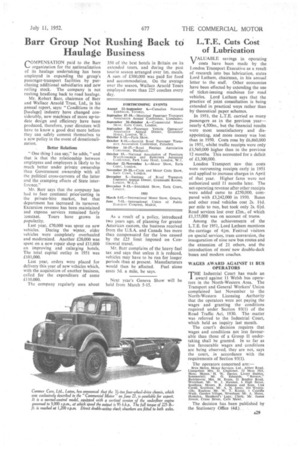L.T.E. Cuts Cost of Lubrication
Page 31

If you've noticed an error in this article please click here to report it so we can fix it.
ViALUABLE savings in operating V cbsts have been made by the London Transport Executive as a result of research into bus lubrication, states Lord Latham, chairman, in his annual letter to the staff. Other economies have been effected by extending the use of ticket-issuing machines for road vehicles. Lord Latham says that the practice of joint consultation is being extended in practical ways rather than by theoretical paper schemes.
In 1951, the L.T.E. carried as many passengers as in the previous year— nearly 4,500m., but the financial results were most unsatisfactory and disappointing, and more money was lost than in 1950. Costs rose by £6,860,000 in 1951, whilst traffic receipts were only £3,560,000 higher than in the previous 12 months. This accounted for a deficit of I3,300,000.
London Transport saw that costs were outrunning receipts early in 1951 and applied to increase charges in April of that year. Higher fares were not authorized until 11 months later. The net operating revenue after other receipts were added came to £250,000, compared with £3,242,000 in 1950. Buses and other road vehicles cost 2s. lid. per mile to run, but took only 2s. ON. Road services lost over £2m., of which £1,155,000 was on account of trams.
Among the achievements of the L.T.E. for 1951, Lord Latham mentions the carriage of 4im. Festival visitors on special services, tram conversion, the inauguration of nine new bus routes and the extension of 21 others, and the introduction of more new double-deck buses and modem coaches.
WAGES AWARD AGAINST 11 BUS OPERATORS
THE Industrial Court has made an ,award against 11 Welsh bus operators in the North-Western Area. The Transport and General Workers' Union complained last November to the North-Western Licensing Authority that the operators were not paying the wages and granting the conditions required under Section 93(1) of the Road Traffic Act, 1930. The matter was referred to the Industrial Court, which held an inquiry last month.
The court's decision requires that wages and conditions not less favourable than those of a Group II undertaking shall be granted. In so far as less favourable wages and conditions are being observed, they are not, says the court, in accordance with the requirements of Section 93(1).
• The operators concerned are:— Bryn Melyn, Motor Services. Ltd.. Abbey Road. Llangollen; Mrs. D. Clialloner, 33 Moss Hill, Moss; Messrs. H. W. Davies, Livery Stables, Sommerhin; Mr. G. Edwards, "Berwyn," BwIchawyn; Mrs. M. Evans, 21 Bradley Road, Wrexham; Mr. W. I. Hanmer, 8 High Street, Southsea; Messrs. R. Johnson and Sons, Llya Cerdd, Southsea:. Mr. A. N. Jones, 104 Wynnevine, Ruabon; . Mr. W. T.. Keeler, I Cunliffe
• Walk, Garden. Village, Wrexham; Mr. A. Mates. Hontelca Shepherd's Lane; Chirk; Mr. 'James lesson, bane Street, Cefn
The decision has beenpublished by the Stationery Office (4d.)...




















































































